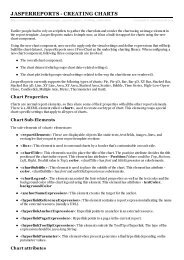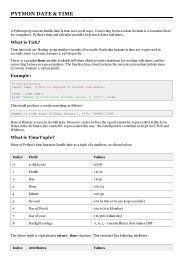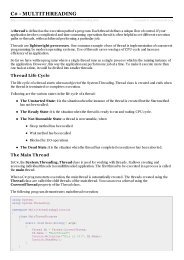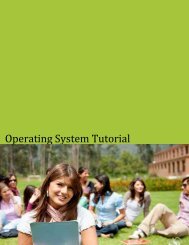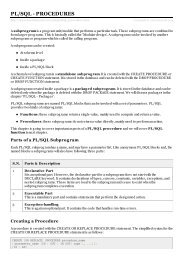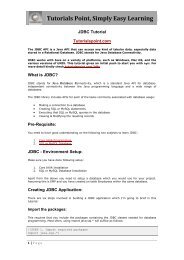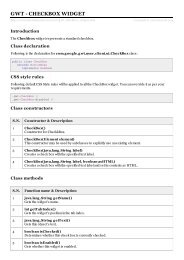Download Scala Tutorial (PDF Version) - Tutorials Point
Download Scala Tutorial (PDF Version) - Tutorials Point
Download Scala Tutorial (PDF Version) - Tutorials Point
Create successful ePaper yourself
Turn your PDF publications into a flip-book with our unique Google optimized e-Paper software.
6<br />
7<br />
8<br />
9<br />
10<br />
11<br />
12<br />
13<br />
14<br />
def filter(p: (A) => Boolean): Option[A]<br />
Returns this Option if it is nonempty and applying the predicate p to this Option's value returns true. Otherwise, return<br />
None.<br />
def filterNot(p: (A) => Boolean): Option[A]<br />
Returns this Option if it is nonempty and applying the predicate p to this Option's value returns false. Otherwise,<br />
return None.<br />
def flatMap[B](f: (A) => Option[B]): Option[B]<br />
Returns the result of applying f to this Option's value if this Option is nonempty. Returns None if this Option is empty.<br />
def foreach[U](f: (A) => U): Unit<br />
Apply the given procedure f to the option's value, if it is nonempty. Otherwise, do nothing.<br />
def getOrElse[B >: A](default: => B): B<br />
Returns the option's value if the option is nonempty, otherwise return the result of evaluating default.<br />
def isDefined: Boolean<br />
Returns true if the option is an instance of Some, false otherwise.<br />
def iterator: Iterator[A]<br />
Returns a singleton iterator returning the Option's value if it is nonempty, or an empty iterator if the option is empty.<br />
def map[B](f: (A) => B): Option[B]<br />
Returns a Some containing the result of applying f to this Option's value if this Option is nonempty. Otherwise return<br />
None.<br />
def orElse[B >: A](alternative: => Option[B]): Option[B]<br />
Returns this Option if it is nonempty, otherwise return the result of evaluating alternative.<br />
15<br />
def orNull<br />
Returns the option's value if it is nonempty, or null if it is empty.<br />
<strong>Scala</strong> Iterators<br />
An iterator is not a collection, but rather a way to access the elements of a collection one by one. The two basic<br />
operations on an iterator it are next and hasNext. A call to it.next() will return the next element of the iterator and<br />
advance the state of the iterator. You can find out whether there are more elements to return using<br />
Iterator's it.hasNext method.<br />
The most straightforward way to "step through" all the elements returned by an iterator is to use a while loop. Let us<br />
see a real example:<br />
object Test {<br />
def main(args: Array[String]) {<br />
val it = Iterator("a", "number", "of", "words")<br />
}<br />
}<br />
while (it.hasNext){<br />
println(it.next())<br />
}<br />
When the above code is compiled and executed, it produces the following result:<br />
C:/>scalac Test.scala<br />
C:/>scala Test<br />
a<br />
number<br />
TUTORIALS POINT<br />
Simply Easy Learning



